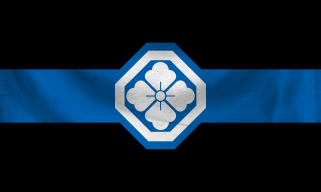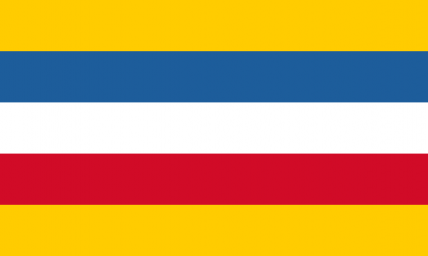Nagytur wrote:(Image)
____________________
BASIC INFORMATION
For this section, please fill out the requested information.
Country name: Kingdom of Nagytúr (Nagytúr Királyság)
Government system: A de jure constitutional monarchy, a de facto military dictatorship.
Population: 6,218,370
Language(s): The two officially recognised languages are Nagytúri (Hungarian) and Olohish (Yiddish). Zigano is also spoken by the ethnic Zigano population, but it is not recognised by the government.
Ethnic composition: 89.3% Nagytúri, 9.7% Olohish, 1% Zigano.
GDP per capita: $12,500
Map claim (high-resolution Imgur link): In black.
ADDITIONAL INFORMATION (optional)
For this section, please fill out the requested information. Filling out this section is suggested to help us get a better idea of your nation but not required.
Human Development Index: 0.662
Gini coefficient: 23.1
Major resources: Bauxite, coal, iron ore, natural gas, manganese.
Major imports: Oil, refined petroleum, chemicals, foodstuffs, machinery equipment, electricity.
Military personnel: 103,810 personnel on active duty, and 225,745 personnel on reserve duty.
Types of equipment and military capabilities: Outdated equipment from the 20th century, ammunition, food and fuel shortages are commonplace. Military equipment is locally produced and is of poor quality.
Foreign policy stance (e.g. non-interventionist): Pariah state, but typically non-interventionist.
LONG-ANSWER QUESTIONS
For this section, please provide at least a paragraph for each. You may provide a link to a previous piece of writing in lieu of a writing sample.
Please describe your nation. (I just got this from my IIWiki article) Nagytúr, officially the Kingdom of Nagytúr (Nagytúri: Nagytúr Királyság), is a sovereign state located on the continent of #NAME# in #somewhere#. Nagytúr is a landlocked country with harsh mountainous terrain. Its capital and largest city is Újferőm. Nagytúr is a constitutional monarchy officially governed by King Árpád II, but de-facto governed by Prime Minister Kristóf Juhász by a military dictatorship.
The recorded history of Nagytúr spans well over 3,000 years, with the first history documented being ancient nomads from the great Karpatakian Empire. Although its harsh terrain has helped preserve the country's rich culture and independence, Nagytúr has fallen under foreign domination and many government changes have occurred. Some examples of this include, the #NAME# invading and exploiting Nagytúr for its rare natural resources, and the Nagytúri Revolution transforming Nagytúr into a socialist nation.
Since independence, Nagytúr has officially been restored to its constitutional monarchic system of governance as it was before foreign take-overs. However, in 2002, a mere nine years after the disestablishment of the socialist state, Nagytúr was ravished by a bloody civil war instigated by communist loyalists in the military, and the pro-government forces executed a bloodless coup d'etat due to their perceived incompetence of the king. The civil war lasted for five years and ended in 2007 after the last rebel stronghold was obliterated, and the rebel commander, Zsombor Dobos was executed. Despite the official end of the war, a low-intensity insurgency has continued throughout the nation, and many politicians and civilians have been claimed by the conflict. Since then there has been a systematic reconstruction and rebuilding process. Despite the end of the civil war, Nagytúr has been increasingly unstable. An attempted assassination on Prime Minister Kristóf Juhász's life took place in 2016, which almost resulted in his death. #authoritarianism increases#
Nagytúr is a very conservative and very religious nation contrasted to its counterparts in the world. 96% of Nagytúris professed their belief in Zsidóság (judaism), making it the largest religion in the country. The Zigano people of Nagytúr follow Mohammedanism.
According to historian Tünde Zobor, nomads from the Karpatakian Empire were the first settlers in modern-day Nagytúr. This claim is universally accepted by historians and is implemented in the national foundation myth. Before the unification under Attila, nomadic pastoralism dominated the mountainous country. The area was roughly divided into sixteen clans, or nemzetség. According to modern historians, linguistic evidence points towards ancient Nagytúri peoples speaking a form of Uralic. The ancient Nagytúri people worshipped a form of sun-centred henotheism, and ancient cave paintings support this hypothesis.
As a federation of unified clans, Nagytúr was established in 1089 under the rule of the mythical Attila. Attila ruthlessly conquered all vastly diverse sixteen clans into a unified nation. This amalgamation of different languages and cultures is commonly accepted as to what gave rise to the modern Nagytúri people and Nagytúri language. Initially, the newfound Khaganate was a decentralised federation of nomadic clans. This changed in 1093 after a peasant rebellion devastated the nation and killed many. Attila introduced sweeping centralisation methods, including peasants swearing an oath of loyalty directly to him, the Khagan, instituting provincial atamans when no such thing existed, and forcefully promoting himself as the clan leader. In 1099, when making the daily ablutions atop Mount Ígért, Attila claimed to have experienced a divine revelation, in which an angel of HaShem revealed golden tablets containing the text of what is the Torá. Attila set it upon himself to convert his realm to this new, divinely inspired faith and did so with relative success.
After this, monarchy is implemented, socialist revolution, monarchy restored, civil war, military coup, and insurgency. I haven't wrote much about these things yet.
Please provide a writing sample (recommended types: roleplay post, wiki article or news article).
Is this enough? If not I can type something up.
IN YOUR OPINION...
For this section, please answer the question from your honest and critical perspective.
...what role will your nation play in Esquarium?: A pariah state that constantly outrages the international community through human right's violations. I hope for there to be another coup sometime and another war which breaks out. I haven't fully thought this out though, so it may not happen.
...what are the strengths of your nation?: Geographical terrain. I'm not sure of anything else.
...what are the weaknesses of your nation?: Importing a large amount of goods, political instability, insurgency.
...in what ways could your nation be viewed as "overpowered"?: Maybe the military numbers? I'm not quite sure.
OOC NOTES
For this section, please fill out the requested information and follow the instructions listed within parentheses.
I am primarily interested in... (delete as appropriate): Worldbuilding
How did you hear about Esquarium?: Browsing through the RP tag on regions.
Names of other NS accounts: None.
Discord username (N/A if none): Nagy#2539.
IIwiki username (N/A if none): Nagy.
Anything else to add? (optional): I am happy to change anything except the religion (exc. changing the name of religion).
First approval, though it's unlikely that mundane human rights violation would raise too much eyebrows in Esquarium given their commonality. I also recommend against having Jews in your country unless there is a reason why they are there, and have to be there.
Also, Attila?
Belgians do not exist. You also lack writing examples.Pinomadura wrote:(Image)
____________________
BASIC INFORMATION
For this section, please fill out the requested information.
Country name: Hergeme
Government system: Republican constitutional civilian dictatorship
Population: 29,000,000
Language(s): Hergemian
Ethnic composition: Belgian, Dutch,
GDP per capita: 19,750
Map claim (high-resolution Imgur link):https://imgur.com/a/Xh67b
ADDITIONAL INFORMATION (optional)
For this section, please fill out the requested information. Filling out this section is suggested to help us get a better idea of your nation but not required. Hergeme is a nation in northern Nordania. It is a republican dictatorship, ruled by a National Leader. The nation contains around 29,000,000 in population. The capital city of Hergeme is Pinomadure
Human Development Index: 0.821
Gini coefficient: 0.62
Major resources: Oil, Timber
Major imports: Oil, Timber, Fish, Food imports, Cars
Military personnel: 380,000
Types of equipment and military capabilities: Modern equipment, equipment used by Netherlands, Belgium, Germany, Denmark, France.
Foreign policy stance (e.g. non-interventionist): Non-interventionist
LONG-ANSWER QUESTIONS
For this section, please provide at least a paragraph for each. You may provide a link to a previous piece of writing in lieu of a writing sample.
Please describe your nation.
Hergeme is a constitutional dictatorship located in northern Nordania on the planet of Esquarium. Hergeme was originally founded in 1504, after several kingdoms and duchies were unified as one kingdom. The monarchy in Hergeme was overthrown in 1858, and a republic was established. But the republic began leaning towards socialism in the early 1900s. Obviously this was a serious problem for most people. Although the people threatened a revolution against a socialist republic, the nation became communist in 1912. This led to a bloody but quick revolution in which the people re-took their liberty. Alio, great-grandosn of the previous monarch, was crowned Alio III that year. The monarchy once again ruled, and was popular among the people. But a faction known as the Jacobins which organized the 1858 revolution began an underground resistance to the monarchy, spreading propaganda and preparing for another revolution. Alio III was determined not to let this happen. Jacobin revolts were quelled across the country. 1917, 1918, 1920, 1923, the years passed by, the Jacobins attempted to rebel. People now hated them. But then, Alio III was assasinated in 1925. The nation collapsed. Alio's son Karel Jeame tried to regain control, but failed. Anarchy reigned for three years. In 1928 the constitutional dictatorship of today was built after a far-right organization took power. Karel Jeame's younger brother Alten was the first Leadere Nationale
Please provide a writing sample (recommended types: roleplay post, wiki article or news article).
IN YOUR OPINION...
For this section, please answer the question from your honest and critical perspective.
...what role will your nation play in Esquarium?: A naval power, but neutral mainly.
...what are the strengths of your nation?: Navy, Industries
...what are the weaknesses of your nation?: Other Military Areas
...in what ways could your nation be viewed as "overpowered"?: I really don't know
OOC NOTES
For this section, please fill out the requested information and follow the instructions listed within parentheses.
I am primarily interested in... (delete as appropriate): both equally
How did you hear about Esquarium?: It's known to all RPers. My main is in Aeia.
Names of other NS accounts: Hergemoth, Rouesia.
Discord username (N/A if none): Herg
IIwiki username (N/A if none): Hergemoth
Anything else to add? (optional):







